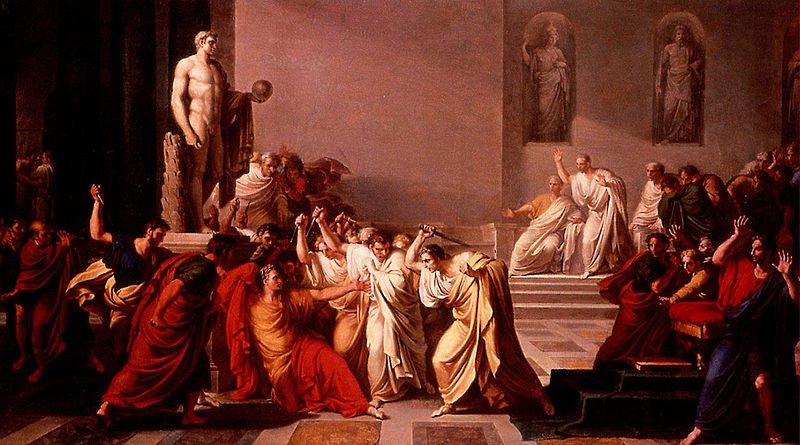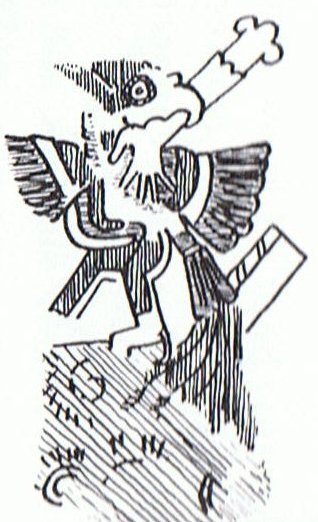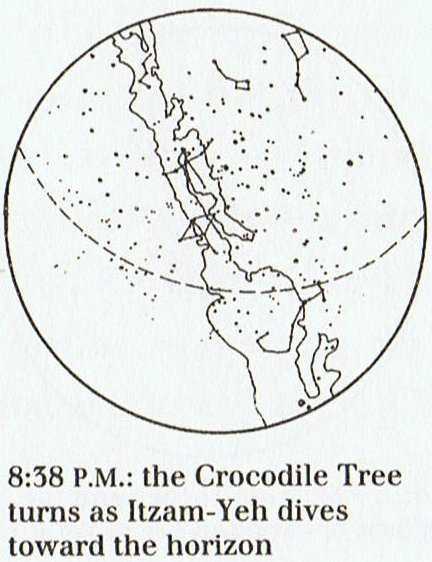|
584
80 And we should remember the warning of Spurinna: ... The brutes of spring caused the downfall of both Captain Cook and Julius Caesar. We are close to the key myth of mankind, that which explains the regeneration of sun and of growth. Once at least some people kept the tradition living. I became interested in what really happened at March 15 and reopened Henrikson to find out: Caesar had been forewarned of the threat by the prophet Spurinna, who told him that a great threat was coming at Idus Martiae or just before [i.e. at 3-14]. The day arrived and Caesar was still living, walking to his meeting with the Senate when he happened to encounter Spurinna and told him jokingly that he was still alive. Spurinna calmely answered that the day had yet not ended ...
... but Enkidu tears out the right thigh of the Bull of Heaven and flings it in her face, amidst brutal [→ Brutus] taunts ...
They intended to throw the dead body of Caesar (→ Tammuz, Dumuzi, Thamus) into the river Po (→ the 'dark' river, cfr the Thames), ... Suddenly, from the island of Paxi was heard the voice of someone loudly calling Thamus, so that all were amazed. Thamus was an Egyptian pilot, not known by name to many on board. Twice he was called and made no reply, but the third time he answered; and the caller, raising his voice, said, 'When you come opposite to Palodes, announce that Great Pan is dead.' ... which presumably corresponded to the Milky Way, because the King (Eagle) should be close to his Queen (Cygnus): ... The chaotic tumult in the Curia (where the Senate had their meeting and where they killed Caesar) resulted in his dead body being left lying on the floor, while all the Senators panicked and ran out through the doors in different directions. They had planned to throw his body into the river, but the time of plans and order was in the past. Instead, in the afternoon, three of the slaves of Caesar came and fetched his body, and carried him on a stretcher to his home south of Forum - and one arm was hanging down in the corner where the 4th slave should have been ...
So they carried him home. Which in a way explains why Antinous disappeared into the river. Because in Egypt everything was upside down, with the mountains up in the south instead of up in the north. And the arm of the dead Ceasar worked its way into the soil of mother earth, carrying out its destiny. ... In late September or early October 130, Hadrian and his entourage, among them Antinous, assembled at Heliopolis to set sail upstream as part of a flotilla along the River Nile. The retinue included officials, the Prefect, army and naval commanders, as well as literary and scholarly figures. Possibly also joining them was Lucius Ceionius Commodus, a young aristocrat whom Antinous might have deemed a rival to Hadrian's affections. On their journey up the Nile, they stopped at Hermopolis Magna, the primary shrine to the god Thoth. It was shortly after this, in October [in the year A.D.] 130 - around the time of the festival of Osiris - that Antinous fell into the river and died, probably from drowning. Hadrian publicly announced his death, with gossip soon spreading throughout the Empire that Antinous had been intentionally killed. The nature of Antinous's death remains a mystery to this day, and it is possible that Hadrian himself never knew; however, various hypotheses have been put forward. One possibility is that he was murdered by a conspiracy at court. However, Lambert asserted that this was unlikely because it lacked any supporting historical evidence, and because Antinous himself seemingly exerted little influence over Hadrian, thus meaning that an assassination served little purpose. Another suggestion is that Antinous had died during a voluntary castration as part of an attempt to retain his youth and thus his sexual appeal to Hadrian. However, this is improbable because Hadrian deemed both castration and circumcision to be abominations and as Antinous was aged between 18 and 20 at the time of death, any such operation would have been ineffective. A third possibility is that the death was accidental, perhaps if Antinous was intoxicated. However, in the surviving evidence Hadrian does not describe the death as being an accident; Lambert thought that this was suspicious. Another possibility is that Antinous represented a voluntary human sacrifice. Our earliest surviving evidence for this comes from the writings of Dio Cassius, 80 years after the event, although it would later be repeated in many subsequent sources. In the second century Roman Empire, a belief that the death of one could rejuvenate the health of another was widespread, and Hadrian had been ill for many years; in this scenario, Antinous could have sacrificed himself in the belief that Hadrian would have recovered. Alternately, in Egyptian tradition it was held that sacrifices of boys to the Nile, particularly at the time of the October Osiris festival, would ensure that the River would flood to its full capacity and thus fertilize the valley; this was made all the more urgent as the Nile's floods had been insufficient for full agricultural production in both 129 and 130. In this situation, Hadrian might not have revealed the cause of Antinous's death because he did not wish to appear either physically or politically weak. Conversely, opposing this possibility is the fact that Hadrian disliked human sacrifice and had strengthened laws against it in the Empire ...
|
|||||||||||||||||||||||||||||||||||||||||||||||||||||||||||||||||||||||||||||











